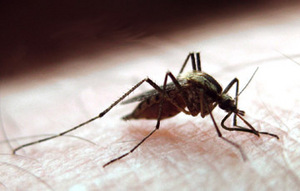Even before the West Nile virus, people disliked mosquitoes. They are an unpleasant nuisance and can ruin an enjoyable summer evening. The best defense against mosquitoes is to avoid being bit. Understanding what attracts mosquitoes is as important as understanding what repels them. Mosquitoes like:
humidity such as perspiration, moist plants, and puddles.
dark clothes and foliate.
carbon dioxide.
lactic acid-more is released after exercising or eating salty or high-potassium foods.
floral scents located in perfumes, hair products, sunscreens, and fabric softeners.
early mornings and evenings.
still air. Most people know that standing water is a breeding ground for mosquitoes and know to change birdbaths, wading pools, and pet dishes at least twice a week to prevent mosquitoes. They also know to treat larger water sources to prevent mosquitoes. It is also important to check the rain gutters. Make sure they are clean so that water drains out and the gutters dry quickly. You should also walk around your property after it has rained and make sure that nothing is collecting water unnoticed.
Holes and depressions in trees can collect water and are difficult to empty. A simple remedy is to spread cooking oil over the area. Females will not lay their eggs on it and any larvae in the water will be unable to emerge. Using Neem oil, which is a natural vegetable oil from India, is even better because it has natural insect repelling properties known as azadirachtins.
Candles naturally attract mosquitoes because they are sources of heat and carbon dioxide. This is the one time attracting mosquitoes is beneficial as it will keep them away from you. A study done by the University of Guelph found that citronella candles reduced mosquito bites by 42% and citronella incense reduced bites by 24%.
The Truth about DEET
Higher concentrates of DEET does work longer than essential oils. Studies show that a 23.8% DEET mosquito repellent will provide between three to six hours of protection. A 20% DEET solution will provide between three to five hours of protection. However, most children’s mosquito repellents contain less than 5% DEET. At that percentage, the repellent will only work about 1 to 2 hours. This is actually less effective than a mosquito repellent that contained a 30% concentration of lemon eucalyptus oil and one that contained a 2% solution of soybean oil. Citronella and Avon Skin-So-Soft® were the least effective and only lasted between 5 to 60 minutes.
Using Essential Oils
Essential oils are an effective alternative to DEET when applied externally on your skin and clothing. You should test any oils on a small patch of skin before applying them-some people can be allergic or develop skin irritations.
You can make your own insect repellent sprays by combining either rubbing alcohol, witch hazel, vodka or olive oil with any of the listed essential oils in a 10 to 1 (alcohol to oil) ratio. Lotions can be made by adding 2 Tablespoons of distilled water, 2 Tablespoons of olive oil, and 120 drops essential oil. Pour the oil slowly into the water while using a wire whip to mix. After oil and water is mixed thoroughly, stir in the essential oil. You might also try adding a few drops of essential oil to your shampoo, liquid soap, and bath oil.
You can make your own essential oil mosquito repellents by combining any of the following oils: castor, cedar, celery extract, clove, citronella, geranium, lemon eucalyptus, fennel, lavender, lemon grass, peppermint, rosemary, and tea tree oil. A few more suggestions about some of the more effective essential oils follows.
Lemon Eucalyptus: Several studies have shown that lemon eucalyptus based mosquito repellents are the most effective among their natural counterparts. The lemon eucalyptus oil must have a minimum of 70% cineole content (the active therapeutic ingredient) to be effective.
Soybean: Second to eucalyptus, soybean oil repellents have been known to be more effective than some DEET based ones.
Citronella: Citronella only lasts about 30 minutes. Citronella candles are effective as a secondary defense.
Fennel: A study in Seoul has shown that mosquito repellent that contained 5% fennel oil was still 85% effective after 90 minutes.
Clove Oil: Two studies have found that undiluted topical clove oil works against mosquitoes. However, it can be irritating and should be diluted before applying to the skin.
Celery Extract: A Thai study found a repellent containing celery extract to be active against a wide range of mosquito species comparable to a 25% DEET formula.
Thyme: Although studies have shown that compounds (carvacrol and alpha-terpinene) contained in thyme can be more effective than DEET, thyme oil is too irritating and strong smelling to be mixed at home. Other Remedies
Marigolds are also natural bug repellents. The flowers give off a fragrance that is unappealing to many insects, including mosquitoes. Thai lemon grass is another plant that naturally repels mosquitoes and has been proven more effective than citronella. It can be found at most garden centers and grows easily in 2-foot tall clumps.
If you’re outside barbequing, try tossing sage or rosemary on the coals. Not only does it help repel mosquitoes, but also smells good. Many people believe that garlic will repel mosquitoes, but scientific studies done by the University of Wisconsin have shown that this not to be the case.
Bats are natural predators to mosquitoes. The average bat can consume about a thousand mosquitoes in an hour and will eat up to 3000 mosquitoes every night. Building or purchasing a bat house can help attract them. And don’t worry, it is a myth that bats will fly into a person’s hair. Although, many people would probably prefer one bat to several thousand mosquitoes.
With the rise in West Nile Virus, avoiding mosquitoes becomes a necessity for anyone who wishes to enjoy the outdoors. Remembering to apply mosquito repellent regularly is important not matter which method you choose. With a little care and prevention, you can enjoy the outdoors without slapping yourself silly.
